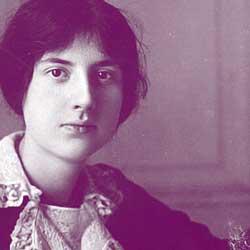Lili Boulanger Biography - A Very Quick Guide
Artist:
Lili Boulanger
Born:
21 August 1893, Paris
Died:
15 March 1918, Mezy-sur-Seine
Lili Boulanger was a French composer whose brief but extraordinary career left a lasting mark on 20th-century music. Born on August 21, 1893, in Paris, she grew up in a deeply musical family. Her father, Ernest Boulanger had been a Prix de Rome–winning composer, her mother Raïssa Myshetskaya was a Russian princess and singer, and her elder sister Nadia Boulanger would become one of the most influential composition teachers of the 20th century.
From an early age, Lili showed exceptional musical talent. Though often frail - she suffered from chronic illness throughout her life - she studied violin, piano, harp, and composition at the Paris Conservatoire. Her delicate health limited her public performances, but it did not curb her creativity.
In 1913, at the age of 19, Lili Boulanger became the first woman ever to win the prestigious Prix de Rome for composition with her cantata Faust et Hélène. This victory established her as a rising star in French music and gave her the opportunity to work in Rome at the Villa Medici, though her illness frequently interrupted her stay.
Her music is marked by an expressive, luminous harmonic language, rooted in the French tradition of Debussy and Fauré, but with a distinctive intensity and emotional depth. Among her best-known works are:
Psalm settings, including Psalm 24, Psalm 129, and the monumental Psalm 130: Du fond de l’abîme, which showcase her mastery of choral and orchestral forces.
Vieille prière bouddhique (1914–17), a striking choral-orchestral work that reflects her wide-ranging spiritual curiosity.
Pie Jesu (1918), a short, profoundly moving work for voice, string quartet, harp, and organ, often seen as her own musical farewell.
Her life was tragically short when she died of Crohn’s disease (then undiagnosed) on March 15, 1918, at just 24 years old. Despite her brief career, her compositions display a rare blend of sensitivity, spiritual searching, and bold harmonic imagination.
Lili Boulanger’s legacy endures not only through her works but also through her sister Nadia, who tirelessly promoted Lili’s music throughout her long life. Today, she is celebrated as a pioneering woman in music and a composer of remarkable originality whose voice continues to resonate more than a century after her death.
From an early age, Lili showed exceptional musical talent. Though often frail - she suffered from chronic illness throughout her life - she studied violin, piano, harp, and composition at the Paris Conservatoire. Her delicate health limited her public performances, but it did not curb her creativity.
In 1913, at the age of 19, Lili Boulanger became the first woman ever to win the prestigious Prix de Rome for composition with her cantata Faust et Hélène. This victory established her as a rising star in French music and gave her the opportunity to work in Rome at the Villa Medici, though her illness frequently interrupted her stay.
Her music is marked by an expressive, luminous harmonic language, rooted in the French tradition of Debussy and Fauré, but with a distinctive intensity and emotional depth. Among her best-known works are:
Psalm settings, including Psalm 24, Psalm 129, and the monumental Psalm 130: Du fond de l’abîme, which showcase her mastery of choral and orchestral forces.
Vieille prière bouddhique (1914–17), a striking choral-orchestral work that reflects her wide-ranging spiritual curiosity.
Pie Jesu (1918), a short, profoundly moving work for voice, string quartet, harp, and organ, often seen as her own musical farewell.
Her life was tragically short when she died of Crohn’s disease (then undiagnosed) on March 15, 1918, at just 24 years old. Despite her brief career, her compositions display a rare blend of sensitivity, spiritual searching, and bold harmonic imagination.
Lili Boulanger’s legacy endures not only through her works but also through her sister Nadia, who tirelessly promoted Lili’s music throughout her long life. Today, she is celebrated as a pioneering woman in music and a composer of remarkable originality whose voice continues to resonate more than a century after her death.
Top Pieces on 8notes by Lili Boulanger
